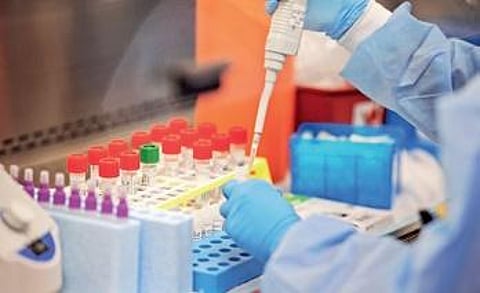

NEW DELHI: The Centre has approved as many as eight clinical trials to test various formulations of AYUSH, dubbed a pseudoscience by many practitioners of modern medicine, on COVID-19 patients amid concerns that most of these trials could be of 'low quality'.
Interestingly, traditional or alternative methods of treatment are a significant 40 per cent of the 20-odd clinical trials approved by the government to assess the efficacy of various interventions related to novel coronavirus patients in India so far.
The AYUSH trials that have been approved by the Drug Controller General of Indian and the Indian Council of Medical Research include testing an Ayurvedic decoction of Tinospora cordifolia (Guduchi) stem added with Piperlongum fruit, nutritional supplement ‘Shreepad Shree Vallabh SSV’ formulation and herbomineral drug ZingVir H.
Other AYUSH trials that have been green-signaled include studying the efficacy of various homeopathic medicines on COVID-19 patients in Gujarat, Maharashtra and Uttar Pradesh.
However, most trials are either non-randomised or single arm, meaning no comparative analysis is being done between two groups of patients, or are only single blinded studies with a low number of patients -- which means participants who don’t know whether they are receiving placebos or drugs get the treatment.
The gold standard is double blinded, randomised clinical trials in which both the participants and experimenters do not know which group got the placebo and which got the experimental treatment.
The approvals have come following a big push by Prime Minister Narendra Modi and the AYUSH ministry to try traditional and alternative forms of medicine to see how effective they are in the treatment and prevention of COVID-19.
Those who have undertaken the trials seem very hopeful.
“I have been prescribing ZingVir H to patients with viral fever and respiratory issues with very good results and am hopeful this will work in COVID-19 patients as an adjuvant therapy,” said Dr J Hareendran Nair, CMD of Pankajakasthuri Herbal Research Foundation, who has started the trial at Mysuru Medical College and plans to do the study at three more centres on 120 patients.
He insisted that the drug has been checked for cytotoxicity in a government lab and was found to be safe.
Saurabh Kumar, a homeopath from Agra, is set to experiment whether a combination of Arsenicum Album, Bryonia Alba, Gelsemium, Antimonium Tartaricum and Crotalus Horridus works on 100 COVID-19 patients at Naiminath Homoeopathic Medical College, Hospital and Research Centre.
“My team is looking to assess whether these medicines can prevent asymptomatic patients from turning symptomatic or in stabilizing those who already are struggling,” he said.
Experts, however, said that trials like these could be seen with a lot of skepticism unless they follow strict quality norms.
“The concern about traditional medicine has mostly been that there have been big claims but little data to support that they work,” said Dr Anant Bhan, a researcher in bioethics and global health. “So it will help if data generated is of good quality. Also, standard treatment should be mandatorily given to all needy COVID-19 patients even if they are being given alternative medicines for boosting or modulating immunity as add-ons.”
Dr Ravi Wankhedkar, former president of the Indian Medical Association, said while any form of medicine that can prevent or cure the infection should be studied, any clinical trials conducted should be "as per standard protocols, well-monitored and on a statistically significant number of persons".